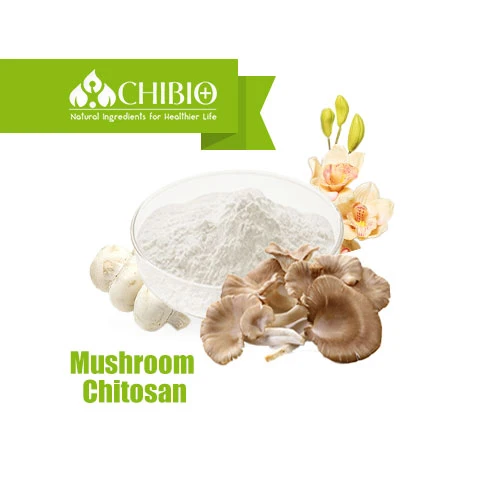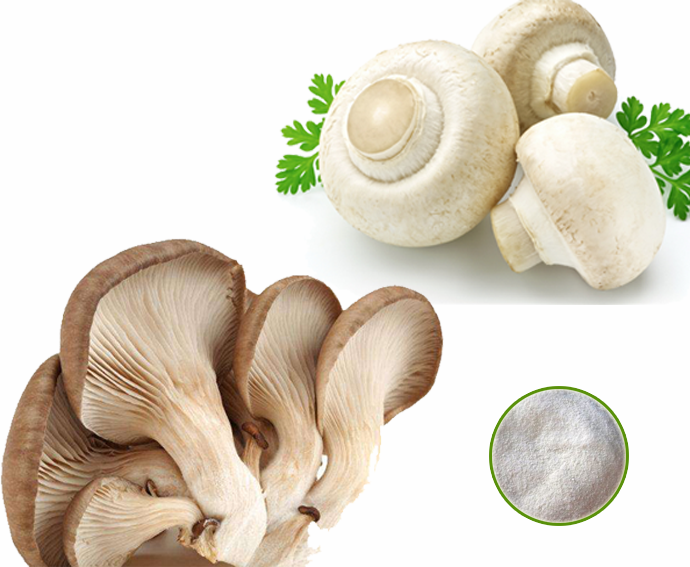Mushroom Chitosan
Mushroom Chitosan
Additional information
| Product Name | Mushroom Chitosan |
|---|---|
| Form | Off-white to light yellow powder |
| Source | oyster mushroom (Pleurotus ostreatus), Agaricus bisporus (white button mushrooms), and organic mushroom |
| Cas No. | 9012-76-4 |
| Specification | Acid-soluble, Water-soluble |
| Main Appliations | Food, Wine, Cosmetics, Pharmaceuticals, Dietary Supplements, Agriculture etc. |
Product Details

Mushroom Chitosan – 100% Plant-based Vegan Non-animal Chitosan
What is Mushroom Chitosan?
Mushroom chitosan is a natural, plant-based biopolymer derived from the cell walls of various mushrooms, including oyster mushrooms (Pleurotus ostreatus), Agaricus bisporus (commonly known as white button mushrooms), and organically cultivated mushrooms.
Mushroom chitosan is a sustainable alternative to traditional chitosan, which is typically extracted from the exoskeletons of crustaceans. It is well-suited for vegan, vegetarian, and allergy-conscious consumers, offering a versatile range of applications across multiple industries.

Sources of Mushroom Chitosan:
- Oyster Mushroom (Pleurotus ostreatus):
- Known for its high yield and ease of cultivation, oyster mushrooms are an excellent source of chitosan. The chitosan derived from oyster mushrooms is recognized for its purity and effectiveness in various applications, including agriculture, pharmaceuticals, and food processing.
- Agaricus Bisporus (White Button Mushroom):
- As one of the most widely consumed mushrooms globally, Agaricus bisporus offers a readily available source of chitosan. This variant is particularly valued in the food and pharmaceutical industries due to its biocompatibility and non-allergenic properties.
- Organic Mushrooms:
- Chitosan sourced from organically grown mushrooms adheres to strict organic farming practices, ensuring that the final product is free from synthetic pesticides and fertilizers. Organic mushroom chitosan is ideal for use in organic food products, eco-friendly cosmetics, and sustainable agricultural practices.
Chitosan is a linear polysaccharide composed of randomly distributed β-(1→4)-linked D-glucosamine (deacetylated unit) and N-acetyl-D-glucosamine (acetylated unit). It is made by treating the chitin shells of shrimp and other crustaceans and cell walls of fungi (Mushroom, Agaricus Bisporus, Aspergillus Niger) with an alkaline substance, like sodium hydroxide.

CAS Number:
- Chitosan CAS No.: 9012-76-4
Chemical Structure:
- Chemical Formula: (C6H11NO4)n
- Mushroom chitosan consists of glucosamine units linked by β-(1→4) glycosidic bonds, providing a structure that is similar to that of animal-derived chitosan but with the added benefits of being plant-based and sustainably sourced.
Specification & Customization
We offer a wide range of grades and specifications for Mushroom Chitosan to meet your specific requirements. Whether you need a particular viscosity, degree of deacetylation, or solubility profile(acid-soluble or water-soluble), we can customize our product to align with your exact needs. Our technical team is ready to collaborate on tailored solutions that drive your business forward.
Molecular Weight:
- The molecular weight of mushroom chitosan can vary depending on the source and processing method, allowing for customization to meet specific application requirements. High molecular weight chitosan is ideal for applications requiring strong adsorption capacity, while low molecular weight chitosan is better suited for biomedical and dietary applications due to its enhanced bioavailability.

This table illustrates a direct correlation between the viscosity and molecular weight of chitosan, where higher molecular weights result in increased viscosity.
This relationship is crucial for selecting the appropriate chitosan grade for various applications, as higher viscosity chitosan, due to its larger molecular structure, is ideal for creating thicker gels and films.
Additionally, the degree of deacetylation influences this relationship, further refining the material’s suitability for specific industrial uses.
Degree of Deacetylation:
- The degree of deacetylation of mushroom chitosan exceeds 85%, (our typically is not less than 98%), making it highly soluble and more reactive, which is beneficial for a variety of industrial and medical uses.
Solubility:
This chitosan is specially formulated to dissolve easily in dilute acidic or water solutions, typically at a 1% solubility ratio, making it ideal for applications requiring a stable, water or acid-soluble polymer. Its high solubility ensures efficient performance in various formulations.

Kindly watch the videos of solubility of different types of vegetal chitosan: https://www.chibiotech.com/video/
Here below are the regular types of mushroom chitosan:
| Source | Product Name | Viscosity | Molecular Weight |
| Oyster Mushroom | Acid-soluble Oyster Mushroom Chitosan | 20-1000cps | 20k – 1500k Da |
| Water-soluble Oyster Mushroom Chitosan Hydrochloride | 20cps | 20k Da | |
| Water-soluble Oyster Mushroom Chitosan Oligosaccharide | <5cps | <5k Da | |
| Water-soluble Oyster Mushroom Chitosan Carboxymethyl (N,O-CMC) | 10-80cps | 10k – 90k Da | |
| Agaricus Bisporus | Acid-soluble Agaricus Bisporus Mushroom Chitosan | 20-1000cps | 20k – 1500k Da |
| Water-soluble Agaricus Bisporus Chitosan Hydrochloride | 20cps | 20k Da | |
| Water-soluble Agaricus Bisporus Chitosan Oligosaccharide | <5cps | <5k Da | |
| Water-soluble Agaricus Bisporus Chitosan Carboxymethyl (N,O-CMC) | 10-80cps | 10k – 90k Da | |
| Organic Mushroom | Acid-soluble Organic Mushroom Chitosan | 20-1000cps | 20k – 1500k Da |
| Water-soluble Organic Mushroom Chitosan Hydrochloride | 20cps | 20k Da | |
| Water-soluble Organic Mushroom Chitosan Oligosaccharide | <5cps | <5k Da | |
| Water-soluble Organic Mushroom Chitosan Carboxymethyl (N,O-CMC) | 10-80cps | 10k – 90k Da |

Benefits & Features:
- Sustainability: Plant-based and derived from renewable sources, mushroom chitosan supports environmentally friendly practices.
- Vegan and Non-Allergenic: Suitable for consumers with dietary restrictions and those allergic to shellfish.
- Versatile Applications: Useful across a wide range of industries, from pharmaceuticals to agriculture.
- High Biocompatibility: Safe for use in medical and cosmetic products due to its compatibility with biological systems.
- Antimicrobial Properties: Naturally inhibits the growth of bacteria and fungi, enhancing product safety and longevity.

Applications:
- Pharmaceuticals:
- Drug Delivery Systems: Used as a biocompatible carrier in drug delivery systems due to its ability to form gels and films.
- Wound Healing: Promotes tissue regeneration and accelerates wound healing, making it valuable in medical dressings and surgical sutures.
- Cosmetics:
- Skin Care: Enhances skin moisture retention, improves texture, and provides protective benefits, making it ideal for creams, lotions, and serums.
- Hair Care: Used in shampoos and conditioners to strengthen hair and improve manageability.
- Food Industry:
- Preservative: Acts as a natural preservative due to its antimicrobial properties, extending the shelf life of food products.
- Dietary Supplements: Promotes weight management and supports digestive health when used as a dietary supplement.
- Agriculture:
- Plant Growth Stimulant: Encourages plant growth and improves crop resilience, making it an effective component in biofertilizers and soil conditioners.
- Biopesticide: Offers a natural alternative to chemical pesticides, promoting sustainable farming practices.
Flowchart
The production process of Mushroom Chitosan follows stringent quality controls, ensuring the highest purity and efficacy. From the initial extraction to final processing, each step is meticulously monitored.

The flowchart of mushroom (oyster mushrooms, Agaricus bisporus & organic mushroom ) chitosan illustrates the process of producing chitosan and its derivatives from mushroom material. Here’s a summary of the key content:
- Starting Material: The process begins with mushroom material as the source.
- Filtration: The mushroom material undergoes a filtration process.
- Protein Removal: Proteins are then removed from the filtered material using an alkali solution.
- Ash Removal: Ash content is subsequently removed with acid.
- Chitin Extraction:
- Acid is added without bubbles to proceed to the next stage.
- Chitin is extracted, which is not soluble in acid.
- An acetylation step removes the acetyl groups from the chitin using sodium hydroxide (NaOH), converting it into chitosan, which is soluble in acid.
- Drying: The acid-soluble chitosan is then dried to produce the final mushroom chitosan product, showcased as a white powder.
- Chitosan Derivatives: Parallel to the drying process, there is a branch leading to the production of various chitosan derivatives:
- Chitosan Hydrochloride: Chitosan converted into its hydrochloride form.
- Enzyme Hydrolysis: Produces chitosan oligosaccharide through enzymatic hydrolysis.
- Carboxymethyl Chitosan: Derived through the carboxymethylation of chitosan.
The flowchart depicts a methodical approach to converting mushroom material into various forms of chitosan, focusing on the purification and chemical modification steps necessary to achieve different chitosan-based products for use in various applications.
Why Choose Us? (More about us)
- Proven Expertise: With over 8 years of experience, Chibio Biotech is a leading innovator in the field of vegetal chitosan (oyster mushroom, agaricus bisporus, organic mushroom and aspergillus niger sources).
- Global Reach: Trusted by top companies across 50+ countries, we are your reliable partner in delivering high-quality, natural ingredients.
- Certified Quality: Our products meet the highest industry standards, with ISO 22000:2018, Kosher, Halal, and Organic certifications. (>>See more about our certificates)
- Customer-Centric Approach: We offer personalized support, from product development to after-sales service, ensuring your complete satisfaction.
Why your businesses consider using vegetal chitosan?
Using vegetal chitosan in your applications or formulations offers significant benefits to businesses, as outlined below:
- Eco-Friendly and Sustainable: Vegetal chitosan is derived from plant sources such as mushrooms and fungi, making it an environmentally sustainable alternative to traditional animal-based chitosan. This aligns with growing consumer demand for green and eco-friendly products.
- Non-Allergenic and Vegan-Friendly: Unlike crustacean-derived chitosan, vegetal chitosan does not trigger shellfish allergies and is suitable for vegan and vegetarian consumers. This widens the market reach for products formulated with vegetal chitosan.
- Versatility and Superior Functionality: Vegetal chitosan offers excellent biocompatibility, biodegradability, and antimicrobial properties. These attributes enhance its utility across various industries, including food, pharmaceuticals, cosmetics, textiles, and agriculture.
- Enhanced Product Performance: In many applications, vegetal chitosan improves product qualities such as moisture retention, antimicrobial efficacy, and barrier properties. This leads to better-performing end products, such as longer shelf-life for food items or improved durability and functionality in textiles.
- Market Differentiation: Incorporating vegetal chitosan allows companies to differentiate their products by promoting natural, sustainable, and allergen-free claims, which are increasingly valued by health-conscious and environmentally aware consumers.
In summary, using vegetal chitosan can help your businesses enhance their product offerings, meet consumer demands for sustainable and non-allergenic ingredients, and improve your overall market positioning.
Explore the potential of Mushroom Chitosan today! Contact us for more details and to request a custom quote. Let’s work together to bring nature’s best to your products.
Get in touch with us to boost your business

- Get Free Sample
- Get Step Quote
- 24/7 Service
- Customized Specification
- Confidentiality Agreement
Headquarter
Block B, Vanke Center, No.2 Heilongjiang South Road, Shibei District, Qingdao City, China 266033
Phone
+86 (0)532 66983270
Cellphone / WhatsApp / WeChat
+86 156 6577 2296
+86 133 8100 5417




